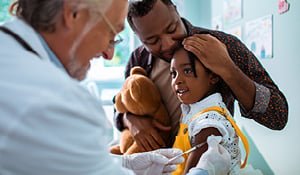Human papillomavirus (HPV) is a very common virus that can cause cancer in both men and women. This includes cervical cancer, which affects more than 12,000 Americans are diagnosed every year.
 Today, cervical cancer is highly preventable with the HPV vaccine and routine testing. Below, Brian Nguyen, D.O.pediatrician with Woodland Health Dignity Clinic answers common questions parents often have about the HPV vaccine.
Today, cervical cancer is highly preventable with the HPV vaccine and routine testing. Below, Brian Nguyen, D.O.pediatrician with Woodland Health Dignity Clinic answers common questions parents often have about the HPV vaccine.
Q: Why is it important for my child to get the HPV vaccine?
Dr. Nguyen: HPV is a very common virus. In the United States, more than half of men and women will be infected with HPV at some point. Most people do not know when they are infected with HPV because it has few or no symptoms.
HPV is the leading cause of cervical cancer in women and penile cancer in men. The virus can also cause other types of cancer, including throat and mouth cancer, anal cancer, vaginal cancer, and vulvar cancer. You can help protect your child from developing these cancers later in life by making sure they get the HPV vaccine.
When should my child get vaccinated?
Dr. Nguyen: It is recommended that all children receive the HPV vaccine between the ages of 9 and 12. Studies have shown that the vaccine works much better for children vaccinated earlier, so it’s best not to wait to get vaccinated. Children ages 9 to 14 only need two doses of vaccine, unlike children 15 and older, who need three.
Is it safe to receive the vaccine at the same time as other recommended vaccines?
Dr. Nguyen: Yes. Many children receive their first dose of the HPV vaccine at the same time as they are vaccinated against meningitis, tetanus, and whooping cough. Your child’s pediatrician can also help you determine the best time for your child to receive the HPV vaccine and can answer any questions you have about vaccine timing and safety.
Is it important for boys to get vaccinated?
Dr. Nguyen: We know that the vaccine is very effective in preventing common types of cancer caused by HPV in men and women. This is why the vaccine is equally recommended for boys and girls. The vaccine protects your child long before he or she is exposed to the cancer-causing virus.
Is the HPV vaccine safe?
Dr. Nguyen: Yes. HPV vaccines are very safe. We know this because hundreds of millions people around the world have received the vaccines. For vaccines to be approved by the CDC and the U.S. Food and Drug Administration (FDA), they had to undergo strict safety testing. The CDC and FDA continue to monitor the safety of HPV vaccines and share their safety concerns with the public.
For parents who are hesitant about vaccinating their child, it is important to note that the HPV vaccine allows children to develop immunity against harmful strains of HPV. For more information about HPV or the HPV vaccine, contact your child’s pediatrician to learn more.



